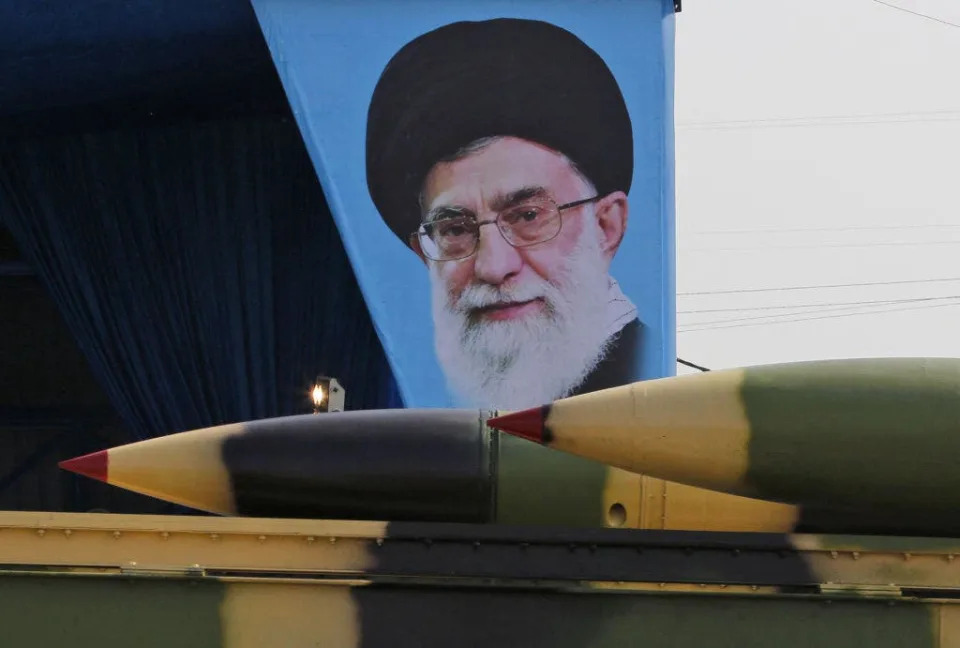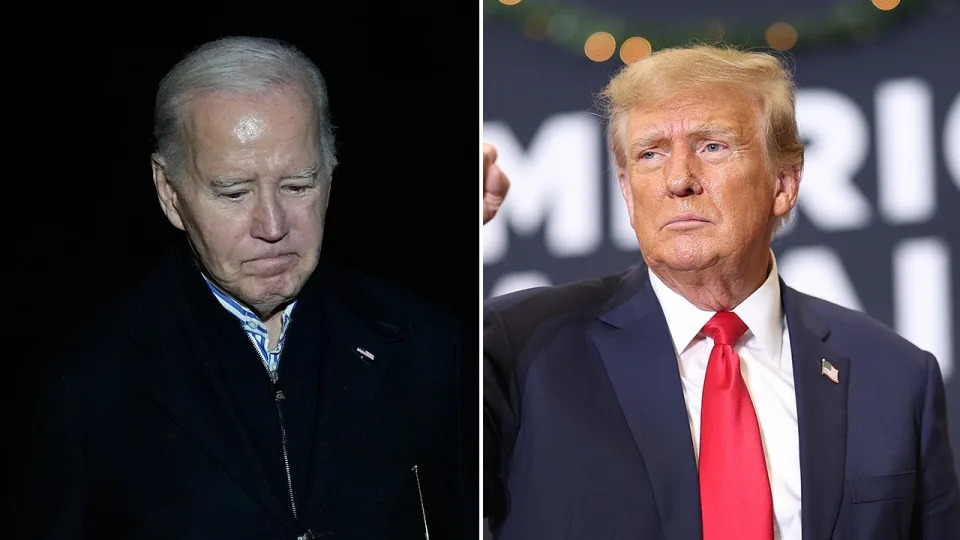Biden’s Iran de-escalation strategy backfiring as regime close to producing atomic bomb

Top Iran experts in the U.S. and in Israel are warning President Biden that his administration’s strategy of de-escalation and containment targeting the world’s worst state-sponsor of terrorism – the Islamic Republic of Iran – has failed and America needs to reestablish deterrence against Tehran as fears of the regime obtaining a nuclear device grow.
Alarming reports about Iran moving at an astonishingly fast pace to possess a nuclear weapon have emerged since last month.
In December, Reuters reported that a confidential IAEA report released to member states said it had "increased its production of highly enriched uranium, reversing a previous output reduction from mid-2023." Reuters also said in its report "that Iran is enriching to up to 60%, close to the roughly 90% that is weapons grade, at its Pilot Fuel Enrichment Plant (PFEP) in its sprawling Natanz complex and at its Fordow Fuel Enrichment Plant (FFEP), which is dug into a mountain."
In a report titled "How quickly could Iran make nuclear weapons today?" published earlier this month by David Albright, a physicist and founder and president of the Institute for Science and International Security, stated, "The long pole in the tent of building nuclear weapons is essentially complete. Iran can quickly make enough weapon-grade uranium for many nuclear weapons, something it could not do in 2003." Albright said Iran had a "crash nuclear weapons program" up until 2003, which it then changed to a "more dispersed nuclear weapons effort."
In his report, Albright, a former U.N. weapons inspector in Iraq, wrote, "Today, it would need only about a week to produce enough for its first nuclear weapon. It could have enough weapon-grade uranium for six weapons in one month, and after five months of producing weapon-grade uranium, it could have enough for 12."
Asked by Fox News Digital about Iran's nuclear ambitions, a State Department spokesperson said, "As the President and the Secretary have made clear, the United States will ensure one way or another that Iran will never obtain a nuclear weapon. We continue to use a variety of tools in pursuit of that goal, and all options remain on the table. As the Secretary has said, we always prefer diplomacy to achieve that goal, but given Iran’s nuclear escalations and its failure to cooperate with the IAEA [International Atomic Energy Agency], unfortunately we are far away from anything like that right now."

Gabriel Noronha, a former U.S. Department State adviser on Iran, told Fox News Digital, "Biden's hope has been to bribe Iran not to advance its nuclear program through economic concessions and non-enforcement of sanctions. Iran advanced its nuclear program anyway and pocketed the extra revenue from oil sales to increase funding to its terror proxies. We have had zero wins on the Iran file in the past three years, but seen their strength return from their weakened state during the policy of maximum pressure."
In addition to the nuclear fears, critics worry about Iran's proxies disrupting the world's economy. The lack of counterattacks against the regime has compounded the dangers for international navigation in the vital Red Sea passage, which is linked to Israel’s port of Eilat and Egypt’s Suez Canal, argue experts.
The U.S. and the U.K. on Friday and Saturday launched pinpoint air strikes against Houthi terrorists in Yemen, whose slogan is: "Allah is great, death to America, death to Israel, curse the Jews, victory to Islam."
"The United States needs to restart a diplomatic pressure campaign to have nations around the world place terror sanctions on Iran's Islamic Revolutionary Guard Corps (IRGC), as well as its proxies like Hamas, Hezbollah and the Houthis. Dozens of countries in the West have not sanctioned these groups and are, accordingly, places where these terror groups can fundraise and conduct activities without appropriate scrutiny," Noronha said.

The Trump administration listed the Houthis as a Foreign Terrorist Organization. However, after Biden entered the White House, he quickly delisted the Houthis as a terrorist entity in February 2021.
When asked last week if the Houthis are a terrorist group, he said, "I think they are," but did not state if he plans re-designate the Houthis as a Foreign Terrorist Organization.
Houthi leaders claim their goal is to stop Israel’s campaign to root out Hamas in Gaza and permit aid to reach Gaza. Yet the Houthis have launched missile attacks against Saudi Arabian oil installations and its cities over the years.
Saudi Arabia – ostensibly sensing U.S. weakness against Iran and the Houthis – is an important American ally in the Middle East but has started to drift out of Washington's orbit toward American adversaries during the Biden presidency.
Iran has been a zealous supporter of Hamas and has provided missiles to the terror organization and the Palestinian Islamic Jihad in the Gaza Strip.

Noronha, who is also a fellow at the Jewish Institute for National Security of America (JINSA), said, "The United States needs to reinstate a campaign of maximum economic pressure against the Iranian regime to cut off its ability to finance and support its terror proxies. Oil sales are the lifeblood of the regime's terror funding, and the U.S. should start enforcing sanctions aggressively as the U.S. did from 2018-2020. Instead, the Biden administration has admitted it is looking the other way in the misplaced hope that it will help ‘de-escalate’ the tensions in the Middle East."
Noronha is one of many veteran Middle East experts urging Biden’s administration to tackle Iran’s clerical regime with more economic pressure and force.
Brig. Gen. Yossi Kuperwasser, an Israeli intelligence and security expert who is now a senior researcher at the Israeli Defense Security Forum, told Fox News Digital the Biden administration "should realize that this war is about their national security and global status as it is about the safety of American and Western citizens, and that sticking to the old strategy will eventually tempt Iran to break out for a nuclear weapon. Therefore, they should force Iran and its proxies to stop their violence and charge them with a much heavier price."

The State Department spokesperson told Fox News Digital, "We take the Iranian threat very seriously overall, as a total package, and we are committed to confronting the full range of Iran’s problematic behaviors, from its human rights abuses to its advancement of its nuclear program, to its support for terrorism and lethal plotting."
The spokesperson added, "Iran is the world’s leading state sponsor of terrorism and a serial human rights abuser. We are joined by a broad cross-section of like-minded partners in confronting all the threats and challenges to security emanating from Iran. And our policy is focused on practical ways to counter these threats. That said, we are constantly evaluating our approach to Iran and finding additional ways to add pressure."
The Trump administration introduced a policy of maximum pressure, a potent amalgamation of diplomatic isolation, economic sanctions and military strikes to reverse Iran’s malign activities. Proponents of Trump’s maximum pressure strategy argue it deterred Iranian jingoism and terrorism and the Middle East was more stable during the 2016-2020 period. The Biden administration favors a path of diplomacy to influence a change in Iran’s behavior.
- Questions and Answers
- Opinion
- Motivational and Inspiring Story
- Technology
- True & Inspiring Quotes
- Live and Let live
- Focus
- Geopolitics
- Military-Arms/Equipment
- Segurança
- Economy/Economic
- Art
- Causes
- Crafts
- Dance
- Drinks
- Film/Movie
- Fitness
- Food
- Jogos
- Gardening
- Health
- Início
- Literature
- Music
- Networking
- Outro
- Party
- Religion
- Shopping
- Sports
- Theater
- Health and Wellness
- News
- Culture

